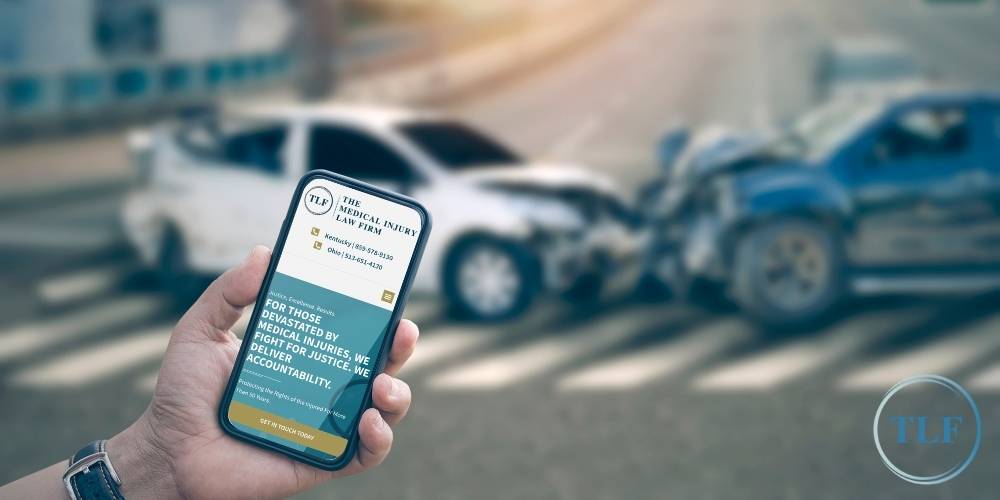In Kentucky’s complex landscape of personal injury law, understanding pure comparative negligence is crucial for anyone pursuing a claim. This concept can significantly impact your personal injury claim and how much compensation you receive.
At TLF: The Medical Injury Law Firm, we know the challenges that cases can present when pure comparative negligence is involved and will do what it takes to help our clients achieve the most favorable outcome possible. Our Northern Kentucky personal injury attorneys have created this guide to provide clients with clarity and understanding as they pursue a claim under the pure comparative negligence system. We hope to empower clients with confidence as they seek the justice and compensation they deserve.
If you’ve been involved in a car accident or other incident where the pure comparative negligence system may come into play, contact TLF: The Medical Injury Law Firm at (800) 698-4054 to schedule a free consultation with one of our experienced personal injury attorneys.
What is Pure Comparative Negligence?
Pure comparative negligence is a legal principle to resolve personal injury cases where multiple parties share fault. Unlike contributory negligence, which obstructs recovery if the claimant is even partially responsible, pure comparative negligence allows an injured party to recover damages even if they are 99% at fault, with their compensation reduced by their percentage of fault.
This legal approach ensures that all parties affected are held accountable for their contribution to the auto accident, allowing plaintiffs to receive at least a portion of the damages corresponding to the defendant’s degree of fault. This system emphasizes the idea that everyone should accept the financial burden of their actions, providing a fair and balanced method of determining compensation in complex personal injury claims.

Pure Comparative Negligence vs. Modified Comparative Negligence
Both pure and modified comparative negligence concepts play crucial roles in determining compensation in personal injury cases. Kentucky is a pure comparative negligence state that allows individuals to seek compensation even when they are 99% at fault for their injury, with the award reduced by their percentage of fault.
Some states, like Ohio, follow modified comparative negligence laws, where an injured party can only secure damages if found to be less than 50% responsible for the incident. Should their fault level exceed 50%, they are ineligible to receive compensation.
At TLF: The Medical Injury Law Firm, we proudly serve clients in Kentucky and Ohio, meaning that our attorneys are well-versed in both negligence laws. No matter where your car accident or other personal injury accident occurred, you can trust our law firm to provide a strong defense tailored to the unique circumstances and laws within the state where the accident happened.
Is Kentucky a Pure Comparative Negligence State?
Yes, Kentucky is one of 13 states that adheres to pure comparative negligence, according to Kentucky Revised Statutes 411.182. Under Kentucky negligence laws, an injured party can recover damages even if they are partly at fault for the accident or injury.

How the Pure Comparative Negligence Rule Works
According to pure comparative negligence, Kentucky personal injury claims can award an injured party compensation for damages even if they are found to be partially or mostly at fault for the incident that led to their injuries. Under this rule, an injured person’s compensation is directly proportional to the degree of fault attributed to other involved parties.
Essentially, the total amount of damages is calculated, and then this amount is adjusted based on the injured party’s percentage of fault. For example, if the total damages in a case equal $100,000 and the injured party is determined to be 30% liable for the accident, they can still recover 70%, equating to $70,000.
The Role of Evidence
The evidence taken from an accident scene can show each party’s level of involvement in the incident. This can include witness testimonies, surveillance footage, accident reports, medical records, expert opinions, and more.
Each piece of evidence paints a detailed picture of the events leading up to and following the incident. For instance, medical records can demonstrate the extent and nature of the plaintiff’s injuries, while accident reconstruction experts can help determine how and why the incident occurred, providing insights into each party’s level of responsibility.
What This Means for Personal Injury Victims
Pure comparative negligence provides a balanced approach to a personal injury claim stemming from a car or other accident, as it acknowledges that most incidents involve shared responsibilities and complex dynamics. This means that even if the victim is partly at fault, there is still a viable path to obtaining financial recovery for their damages.

Common Challenges in Pure Comparative Negligence Cases
Common challenges in pure comparative negligence cases often revolve around accurately determining each party’s degree of fault. The complications of establishing fault percentages require thorough evidence collection and analysis, including eyewitness accounts, expert testimonies, and forensic investigations. Plus, each party’s legal representation may present conflicting interpretations of the events and evidence to minimize their client’s liability.
This can lead to lengthy legal battles, as negotiations and, potentially, court proceedings unfold to reach a resolution. Claimants may find themselves navigating tricky mediations where the insurance company uses strategies to shift a greater portion of blame onto them, complicating the process of securing fair compensation.
The subjective nature of fault assessment in these cases makes them particularly challenging, as slight variations in the determined percentages of fault can significantly affect the compensation awarded to the injured party.
TLF’s Approach to Navigating Comparative Negligence
TLF: The Medical Injury Law Firm utilizes a sophisticated approach to navigating comparative negligence. Understanding the complexities of comparative negligence laws, our personal injury attorneys meticulously gather and analyze all relevant evidence, from eyewitness testimonies to expert assessments, to construct a compelling argument that accurately reflects the client’s degree of fault.
This enables us to effectively counter attempts by opposing parties or insurance companies to unfairly increase the client’s liability. Additionally, our attorneys employ skilled negotiation tactics, backed by a readiness to proceed to trial if necessary, to advocate for fair compensation.
At TLF: The Medical Injury Law Firm, our client-centered strategy emphasizes clear communication, educating clients about the legal process and their rights, and involves them in key decision-making, ensuring that the path forward aligns with their best interests.

Call the Northern Kentucky Personal Injury Lawyers at TLF To Schedule a Free Consultation Today
If you are looking for experienced legal representation in Northern Kentucky for a personal injury case, contact TLF: The Medical Injury Law Firm. Our team of attorneys has experience handling complicated claims involving comparative negligence laws and is prepared to represent you.
Schedule a free initial consultation by calling our toll-free number at (800) 698-4054 or contact us online to explore your options and learn how our Northern Kentucky personal injury attorneys can help.

